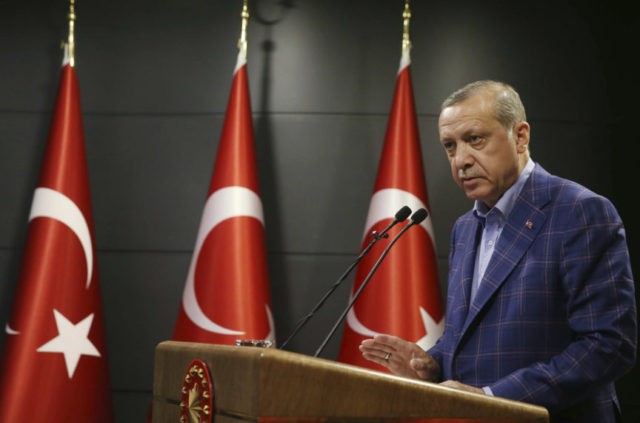The Turkish news outlet T24 reported on Wednesday that the owner of the Doğan Media Group, which controls several of Turkey’s last remaining media outlets that do not openly support President Recep Tayyip Erdogan, agreed to sell the group to Demirören Holding, owned by a businessman who maintains friendly ties with the president.
According to T24, owner Aydin Doğan agreed to sell the group, which was absorbed by the parent organization Doğan Holding in 2014, to Erdogan Demirören and his holding group for $1.2 billion. In addition to Demirören Holding, the outlet claims sources have confirmed that “there is another source of capital behind the purchase.”
Doğan Media Group is the largest media conglomerate in the history of Turkey.
Erdogan Demirören, T24 notes, is “known for his close proximity to power,” referring to President Erdogan.
Neither corporation has confirmed the news, though the report has now circulated in nearly every major Turkish publication. A notable exception at press time is Hurriyet, a Doğan-owned newspaper and one of the most reliable sources of independent reporting in the country. Sabah, a pro-Erdogan newspaper, claims that “Doğan Holding is expected to announce the sale shortly on Public Disclosure Platform (KAP).”
The unconfirmed report says the deal includes Hurriyet and Posta newspapers, as well as Kanal D and CNN Turk TV. {2/3)
— BBC Monitoring (@BBCMonitoring) March 21, 2018
Dogan Media Group sold Milliyet and Vatan newspaper to Demiroren in 2011, after which both papers adopted a staunchly pro-government line. (3/3)
— BBC Monitoring (@BBCMonitoring) March 21, 2018
In addition to Hurriyet, the media outlets affected would include the publications Fanatik and Posta, and the broadcast networks Kanal D and CNN Türk. The conglomerate used to own the publications Milliyet and Vatan after Erdogan’s Islamist government convicted the Doğan Media Group of tax evasion in 2009, forcing the company to sell some of its properties. Milliyet and Vatan were sold in 2011.
Aydin Doğan faced significant pressure for years from President Erdogan to silence his media properties.
Erdogan Demirören is a “pro-government entrepreneur” who owns, among other media properties, a shopping mall in Istanbul and a private secondary school and has ties to the Turkish Football [soccer] Federation, previously run by his father. The mogul held a highly publicized meeting with President Erdogan in 2007 and is considered an ally of the Islamist ruling Justice and Development Party (AKP).
The transfer of ownership of Hurriyet from an independent businessman to a friend of Erdogan’s may leave Cumhuriyet, a secularist newspaper founded in 1924 by an ally of Mustafa Kemal Atatürk, as one of the only news publications remaining challenging the government. Cumhuriyet staff have faced multiple arrests and raids for, among other things, publishing a Turkish-language insert version of Charlie Hebdo and revealing that Turkish intelligence agents were arming rebels in Syria. Its former editor-in-chief, Can Dündar, survived an assassination attempt at the steps of the courthouse where he was on trial for “terrorism” for publishing the Syria report and was forced to step down and seek political asylum in Europe with his family.
The memory of Atatürk—the insulting of which remains a crime in Turkey—appears to have kept Cumhuriyet afloat against years of attacks from the Erdogan regime.
While Cumhuriyet survives, another newspaper that faced a similar fate to Hurriyet, the now-defunct Zaman, found itself among the most vocal supporters of the Islamists in Ankara following a government takeover. Unlike Hurriyet, the government absorbed Zaman in a violent takeover in 2016, equating its critical coverage of the Erdogan regime to terrorist propaganda. At the time, it was the nation’s largest newspaper. The government fired or arrested most existing staff and replaced them with government-approved writers and editors before finally shutting the newspaper down in July 2016, following the failed coup against Erdogan.
Hurriyet‘s news reporting has never been as brazen as Cumhuriyet‘s, but it does publish controversial opinion columnists, such as the secularist Ahmet Hakan. Hakan, also a CNN Türk program host, was beaten by an Islamist gang in 2015 after the Erdogan regime accused Doğan media of “terrorist propaganda.”
Notably, Ahmet Hakan’s latest column at Hurriyet is critical of the Kurdish People’s Protection Units (YPG), currently embroiled in a war with Erdogan’s Turkish army—a bizarre opinion for a man Erdogan’s lackeys in print journalist have referred to as a “propagandist” for the Kurds.
Hurriyet has faced multiple attacks on its offices in the past three years for publishing unflattering news about Erdogan. In 2015, a mob of 150 Islamists led by an AKP lawmaker shouting “Allahu Akbar” attacked the Istanbul offices of the newspaper, stoning the walls and attempting to enter at assault its staff.
“Hürriyet is Turkey’s most influential newspaper and a symbol of free journalism. Attacks on any newspaper should be condemned, but the attack on a paper with this kind of identity will particularly be put as a black page in Turkey’s democratic history,” Editor-in-chief Sedat Ergin told CNN Türk at the time. Another mob attacked the Istanbul and Ankara offices of the newspaper yet again two days later with clubs and firearms.
Less than a week later, Erdogan’s regime charged the Doğan Media Group for “terrorist propaganda.” The assault of Ahmet Hakan occurred a month later.

COMMENTS
Please let us know if you're having issues with commenting.